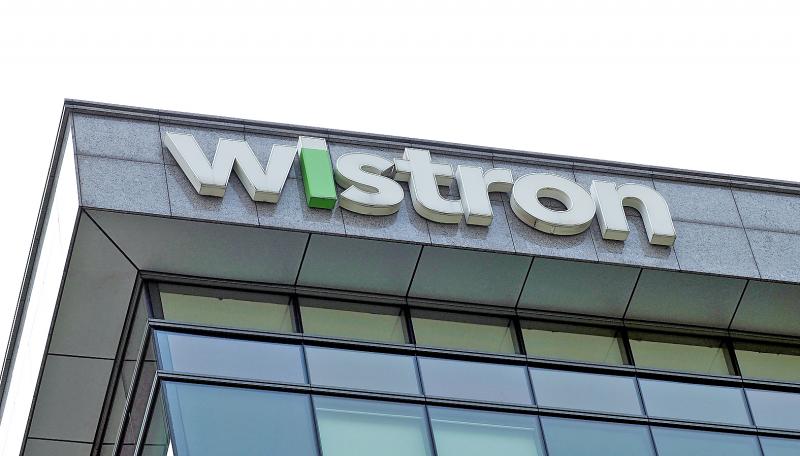Contract electronics manufacturer Wistron Corp (緯創) on Thursday reported revenue of NT$71.9 billion (US$2.56 billion) for last month, up 17.92 percent month-on-month, but down 8.98 percent year-on-year, as component shortages limited its ability to fill orders.
Orders far outpaced the company’s ability to produce goods, whether it was laptops, servers, desktops or monitors, Wistron said in a statement, adding that it was uncertain when the shortages would end.
In the first six months of the year, cumulative revenue decreased 4.2 percent from a year earlier to NT$378.24 billion, the company said.

Photo: EPA-EFE
In a separate statement, Wistron said it would acquire 100 percent of Kaohsiung Opto-Electrics Inc (KOE, 高雄晶傑達光電), a wholly-owned subsidiary of JDI Taiwan Inc (台灣晶端顯示), itself a subsidiary of Tokyo-based Japan Display Inc.
The purchase, to be made through Wistron’s Wise Cap Ltd (鼎創) subsidiary, is tentatively set at a transaction value of ¥8 billion (US$72.62 million).
“The final price will be confirmed after the related parties complete due diligence and sign the share purchase agreement,” Wistron said.
The deal is expected to be completed by the end of this quarter.
“Through this acquisition, Wistron will further strengthen its partnership with JDI, and continue to expand the capacity and product portfolio of KOE,” it said.
Fellow contract electronics maker Inventec Corp (英業達) reported revenue of NT$41.27 billion for last month, up 16.79 percent month-on-month, but down 22.72 percent year-on-year.
In the first six months, revenue totaled NT$226.65 billion, down 4.5 percent from a year earlier, the company said.
Inventec’s product lineup includes notebook computers, smart devices and servers, but component shortages remain an issue and affect its ability to fulfill orders, it said.
Bigger rivals Quanta Computer Inc (廣達), Compal Electronics Inc (仁寶) and Pegatron Corp (和碩) posted mixed revenue results for last month and the first half of the year.
Quanta’s sales last month decreased 3.3 percent year-on-year to NT$90.39 billion, but sales in the first half of the year increased 14.9 percent to NT$529.23 billion.
Compal’s sales increased 11.92 percent to NT$91.44 billion last month and rose 19.13 percent to NT$530.98 billion in the first half of the year, while Pegatron’s sales declined 19.17 percent year-on-year to NT$88.87 billion last month and also fell 19.4 percent to NT$488.82 billion in the first six months.

Taiwan Semiconductor Manufacturing Co (TSMC, 台積電) yesterday said that its investment plan in Arizona is going according to schedule, following a local media report claiming that the company is planning to break ground on its third wafer fab in the US in June. In a statement, TSMC said it does not comment on market speculation, but that its investments in Arizona are proceeding well. TSMC is investing more than US$65 billion in Arizona to build three advanced wafer fabs. The first one has started production using the 4-nanometer (nm) process, while the second one would start mass production using the

A TAIWAN DEAL: TSMC is in early talks to fully operate Intel’s US semiconductor factories in a deal first raised by Trump officials, but Intel’s interest is uncertain Broadcom Inc has had informal talks with its advisers about making a bid for Intel Corp’s chip-design and marketing business, the Wall Street Journal reported, citing people familiar with the matter. Nothing has been submitted to Intel and Broadcom could decide not to pursue a deal, according to the Journal. Bloomberg News earlier reported that Taiwan Semiconductor Manufacturing Co (TSMC, 台積電) is in early talks for a controlling stake in Intel’s factories at the request of officials at US President Donald Trump’s administration, as the president looks to boost US manufacturing and maintain the country’s leadership in critical technologies. Trump officials raised the

‘SILVER LINING’: Although the news caused TSMC to fall on the local market, an analyst said that as tariffs are not set to go into effect until April, there is still time for negotiations US President Donald Trump on Tuesday said that he would likely impose tariffs on semiconductor, automobile and pharmaceutical imports of about 25 percent, with an announcement coming as soon as April 2 in a move that would represent a dramatic widening of the US leader’s trade war. “I probably will tell you that on April 2, but it’ll be in the neighborhood of 25 percent,” Trump told reporters at his Mar-a-Lago club when asked about his plan for auto tariffs. Asked about similar levies on pharmaceutical drugs and semiconductors, the president said that “it’ll be 25 percent and higher, and it’ll

CHIP BOOM: Revenue for the semiconductor industry is set to reach US$1 trillion by 2032, opening up opportunities for the chip pacakging and testing company, it said ASE Technology Holding Co (日月光投控), the world’s largest provider of outsourced semiconductor assembly and test (OSAT) services, yesterday launched a new advanced manufacturing facility in Penang, Malaysia, aiming to meet growing demand for emerging technologies such as generative artificial intelligence (AI) applications. The US$300 million facility is a critical step in expanding ASE’s global footprint, offering an alternative for customers from the US, Europe, Japan, South Korea and China to assemble and test chips outside of Taiwan amid efforts to diversify supply chains. The plant, the company’s fifth in Malaysia, is part of a strategic expansion plan that would more than triple